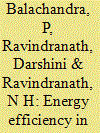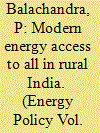|
|
|
Sort Order |
|
|
|
Items / Page
|
|
|
|
|
|
|
| Srl | Item |
| 1 |
ID:
109603


|
|
|
|
|
| Publication |
2011.
|
| Summary/Abstract |
There is a large interest in biofuels in India as a substitute to petroleum-based fuels, with a purpose of enhancing energy security and promoting rural development. India has announced an ambitious target of substituting 20% of fossil fuel consumption by biodiesel and bioethanol by 2017. India has announced a national biofuel policy and launched a large program to promote biofuel production, particularly on wastelands: its implications need to be studied intensively considering the fact that India is a large developing country with high population density and large rural population depending upon land for their livelihood. Another factor is that Indian economy is experiencing high growth rate, which may lead to enhanced demand for food, livestock products, timber, paper, etc., with implications for land use. Studies have shown that area under agriculture and forest has nearly stabilized over the past 2-3 decades. This paper presents an assessment of the implications of projected large-scale biofuel production on land available for food production, water, biodiversity, rural development and GHG emissions. The assessment will be largely focused on first generation biofuel crops, since the Indian program is currently dominated by these crops. Technological and policy options required for promoting sustainable biofuel production will be discussed.
|
|
|
|
|
|
|
|
|
|
|
|
|
|
|
|
| 2 |
ID:
094244


|
|
|
|
|
| Publication |
2010.
|
| Summary/Abstract |
Decentralized Energy Planning (DEP) is one of the options to meet the rural and small-scale energy needs in a reliable, affordable and environmentally sustainable way. The main aspect of the energy planning at decentralized level would be to prepare an area-based DEP to meet energy needs and development of alternate energy sources at least-cost to the economy and environment. Present work uses goal-programming method in order to analyze the DEP through bottom-up approach. This approach includes planning from the lowest scale of Tumkur district in India. The scale of analysis included village level-Ungra, panchayat level (local council)-Yedavani, block level-Kunigal and district level-Tumkur. The approach adopted was bottom-up (village to district) to allow a detailed description of energy services and the resulting demand for energy forms and supply technologies. Different scenarios are considered at four decentralized scales for the year 2005 and are developed and analyzed for the year 2020. Decentralized bioenergy system for producing biogas and electricity, using local biomass resources, are shown to promote development compared to other renewables. This is because, apart from meeting energy needs, multiple goals could be achieved such as self-reliance, local employment, and land reclamation apart from CO2 emissions reduction.
|
|
|
|
|
|
|
|
|
|
|
|
|
|
|
|
| 3 |
ID:
099209


|
|
|
|
|
| Publication |
2010.
|
| Summary/Abstract |
In the recent years, India has emerged as one of the fast growing economies of the world necessitating equally rapid increase in modern energy consumption. With an imminent global climate change threat, India will have difficulties in continuing with this rising energy use levels towards achieving high economic growth. It will have to follow an energy-efficient pathway in attaining this goal. In this context, an attempt is made to present India's achievements on the energy efficiency front by tracing the evolution of policies and their impacts. The results indicate that India has made substantial progress in improving energy efficiency which is evident from the reductions achieved in energy intensities of GDP to the tune of 88% during 1980-2007. Similar reductions have been observed both with respect to overall Indian economy and the major sectors of the economy. In terms of energy intensity of GDP, India occupies a relatively high position of nine among the top 30 energy consuming countries of the world.
|
|
|
|
|
|
|
|
|
|
|
|
|
|
|
|
| 4 |
ID:
110720


|
|
|
|
|
| Publication |
2011.
|
| Summary/Abstract |
Expanding energy access to the rural population of India presents a critical challenge for its government. The presence of 364 million people without access to electricity and 726 million who rely on biomass for cooking indicate both the failure of past policies and programs, and the need for a radical redesign of the current system. We propose an integrated implementation framework with recommendations for adopting business principles with innovative institutional, regulatory, financing and delivery mechanisms. The framework entails establishment of rural energy access authorities and energy access funds, both at the national and regional levels, to be empowered with enabling regulatory policies, capital resources and the support of multi-stakeholder partnership. These institutions are expected to design, lead, manage and monitor the rural energy interventions. At the other end, trained entrepreneurs would be expected to establish bioenergy-based micro-enterprises that will produce and distribute energy carriers to rural households at an affordable cost. The ESCOs will function as intermediaries between these enterprises and the international carbon market both in aggregating carbon credits and in trading them under CDM. If implemented, such a program could address the challenges of rural energy empowerment by creating access to modern energy carriers and climate change mitigation.
|
|
|
|
|
|
|
|
|
|
|
|
|
|
|
|
| 5 |
ID:
092783


|
|
|
|
|
| Publication |
2009.
|
| Summary/Abstract |
Provision of modern energy services for cooking (with gaseous fuels) and lighting (with electricity) is an essential component of any policy aiming to address health, education or welfare issues; yet it gets little attention from policy-makers. Secure, adequate, low-cost energy of quality and convenience is core to the delivery of these services. The present study analyses the energy consumption pattern of Indian domestic sector and examines the urban-rural divide and income energy linkage. A comprehensive analysis is done to estimate the cost for providing modern energy services to everyone by 2030. A public-private partnership-driven business model, with entrepreneurship at the core, is developed with institutional, financing and pricing mechanisms for diffusion of energy services. This approach, termed as EMPOWERS (entrepreneurship model for provision of wholesome energy-related basic services), if adopted, can facilitate large-scale dissemination of energy-efficient and renewable technologies like small-scale biogas/biofuel plants, and distributed power generation technologies to provide clean, safe, reliable and sustainable energy to rural households and urban poor. It is expected to integrate the processes of market transformation and entrepreneurship development involving government, NGOs, financial institutions and community groups as stakeholders.
|
|
|
|
|
|
|
|
|
|
|
|
|
|
|
|
|
|
|
|
|